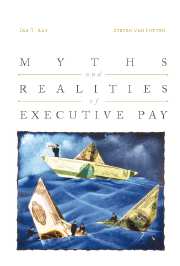Book contents
- Frontmatter
- Contents
- Acknowledgments
- Prologue: The Compensation Committee Meets
- Introduction: The Battle over Executive Compensation
- 1 The Myths and Realities of Pay-for-Performance
- 2 Managerial Power
- 3 External Pressures: The New Context for Executive Compensation
- 4 End of an Era: The Decline of the Stock Option
- 5 The Future of Long-Term Incentives
- 6 Executive Stock Ownership: The Solution to the Executive Compensation Crisis
- 7 Director Compensation in the New Environment
- 8 The Compensation Committee: Creating a Balance between Shareholders and Executives
- 9 Aligning All Employee Pay to Improve Corporate Performance
- 10 International Executive Pay Comparisons
- Conclusion: The Future of Executive Compensation
- Epilogue: Back in the Boardroom
- Appendix A Legal and Regulatory Requirements for Executive Compensation Plans
- Appendix B Summary of the Regulatory and Institutional Mandates and Recommendations
- Appendix C Academic Articles on Pay-for-Performance and the Effectiveness of the Executive Labor Market
- Notes
- Index
7 - Director Compensation in the New Environment
Published online by Cambridge University Press: 31 July 2009
- Frontmatter
- Contents
- Acknowledgments
- Prologue: The Compensation Committee Meets
- Introduction: The Battle over Executive Compensation
- 1 The Myths and Realities of Pay-for-Performance
- 2 Managerial Power
- 3 External Pressures: The New Context for Executive Compensation
- 4 End of an Era: The Decline of the Stock Option
- 5 The Future of Long-Term Incentives
- 6 Executive Stock Ownership: The Solution to the Executive Compensation Crisis
- 7 Director Compensation in the New Environment
- 8 The Compensation Committee: Creating a Balance between Shareholders and Executives
- 9 Aligning All Employee Pay to Improve Corporate Performance
- 10 International Executive Pay Comparisons
- Conclusion: The Future of Executive Compensation
- Epilogue: Back in the Boardroom
- Appendix A Legal and Regulatory Requirements for Executive Compensation Plans
- Appendix B Summary of the Regulatory and Institutional Mandates and Recommendations
- Appendix C Academic Articles on Pay-for-Performance and the Effectiveness of the Executive Labor Market
- Notes
- Index
Summary
The trade-offs of becoming a director of a corporation don't look nearly as attractive these days. The compensation hasn't gone up that much, the hours have gone up a lot and the liabilities have increased.
John A. Thain, CEO, New York Stock ExchangeWanted: To serve on the board of directors of a Fortune 1000 company, an individual (current or former chief executive or financial officer most desirable) of high moral character and strength of convictions. Must have the ability to engage in constructive dialogue with the CEO and other senior management while maintaining strict independence. Must be willing to take on significant financial and reputational risks. Substantial time commitment. Annual pay: approximately $170,000, nonnegotiable.
For many years, serving as an outside director of a prominent company was a coveted role. A seat on the board of a Fortune 1000 company earned its holder the respect of peers and the opportunity to interact with other prominent people from other high-profile companies. While the pay was never comparable to what most directors made in their full-time jobs, it gave many retired executives a continued income stream and a valuable benefits package. Moreover, the time commitment and the work were not particularly strenuous, and there was little risk to reputation or finances. All of this changed in the early 2000s.
The Sarbanes-Oxley Act and stock exchange listing requirements have forced many companies to bring on new independent directors who have no interlocking relationships with the company and who must represent a majority of the board and constitute the compensation and audit committees.
- Type
- Chapter
- Information
- Myths and Realities of Executive Pay , pp. 123 - 140Publisher: Cambridge University PressPrint publication year: 2007



